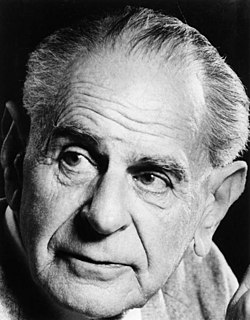Karl R. Popper Quote
The principle of the national state, that is to say, the political demand that the territory of every state should coincide with the territory inhabited by one nation, is by no means so self-evident as it seems to appear to many people to-day. Even if anyone knew what he meant when he spoke of nationality, it would be not at all clear why nationality should be accepted as a fundamental political category, more important for instance than religion, or birth within a certain geographical region, or loyalty to a dynasty, or a political creed like democracy (which forms, one might say, the uniting factor of multi-lingual Switzerland).
Karl R. Popper
The principle of the national state, that is to say, the political demand that the territory of every state should coincide with the territory inhabited by one nation, is by no means so self-evident as it seems to appear to many people to-day. Even if anyone knew what he meant when he spoke of nationality, it would be not at all clear why nationality should be accepted as a fundamental political category, more important for instance than religion, or birth within a certain geographical region, or loyalty to a dynasty, or a political creed like democracy (which forms, one might say, the uniting factor of multi-lingual Switzerland).
Related Quotes
About Karl R. Popper
Sir Karl Raimund Popper (28 July 1902 – 17 September 1994) was an Austrian–British philosopher, academic and social commentator. One of the 20th century's most influential philosophers of science, Popper is known for his rejection of the classical inductivist views on the scientific method in favour of empirical falsification, and for founding the Department of Philosophy at the London School of Economics. According to Popper, a theory in the empirical sciences can never be proven, but it can be falsified, meaning that it can (and should) be scrutinised with decisive experiments. Popper was opposed to the classical justificationist account of knowledge, which he replaced with "the first non-justificational philosophy of criticism in the history of philosophy", namely critical rationalism.
In political discourse, he is known for his vigorous defence of liberal democracy and the principles of social criticism that he believed made a flourishing open society possible. His political thought resides within the camp of Enlightenment rationalism and humanism. He was a dogged opponent of totalitarianism, nationalism, fascism, romanticism, collectivism, and other kinds of (in Popper's view) reactionary and irrational ideas, and identified modern liberal democracies as the best-to-date embodiment of an open society.
In political discourse, he is known for his vigorous defence of liberal democracy and the principles of social criticism that he believed made a flourishing open society possible. His political thought resides within the camp of Enlightenment rationalism and humanism. He was a dogged opponent of totalitarianism, nationalism, fascism, romanticism, collectivism, and other kinds of (in Popper's view) reactionary and irrational ideas, and identified modern liberal democracies as the best-to-date embodiment of an open society.
